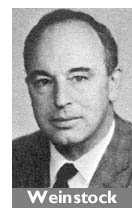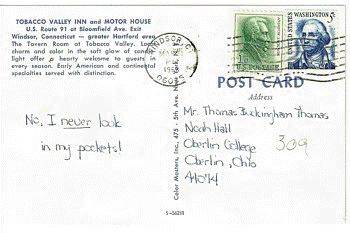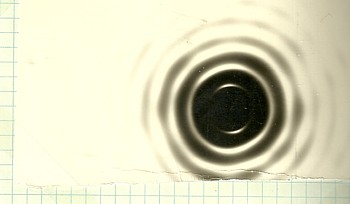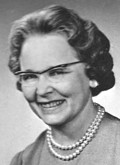|
|
|
Apr |
||||||||||||||
|
^ |
April 1968
Added to website
April 1, 2018
Our
nine-day vacation was over. We students returned to the Oberlin
College campus, where classes resumed on Monday, April 1.
|
Tuesday evening I ate dinner at Robert Weinstock's house. The professor had invited six physics majors — three seniors plus Jan Olson, Doug Brown, and myself — to dine on roast beef with asparagus. We stayed till 10:00, discussing how students had changed over the last five years, the racial unrest in the cities, and the merits of popular music. I received the postcard below the next day. Jan, my lab partner, had mailed it on her last day of spring break. (For the backstory, see here.) |
|
|
|
On that Wednesday afternoon, she and I resumed our study of interference fringes. This time we aimed a red laser through a pinhole onto photographic paper fastened to a wall 30 feet away, at the far end of a narrow room in the Physics 36 lab. Developing the paper would give us images like this. Then we'd have to measure the distance between the rings and relate it to the wavelength of the light. |
|
|
We needed to shut the door to achieve the necessary darkness while we waited for the occasional photon to strike the paper. This required exposures as long as 30 minutes. Being a gentleman alone in the dark for half an hour with an attractive young lady, I was careful not to make her uncomfortable. I kept my distance as much as possible. We made small talk.
Honors
The next day was Thursday. A letter arrived informing me that I had been elected to the honorary Phi Beta Kappa society. How did that happen? “Apparently I'm in the top six in my class by grade average,” I wrote my parents. “Jan seems quite thrilled about my election — she'd predicted it before spring vacation, though I didn't have as much confidence in myself as she did — and I imagine you are, too.”
Also that afternoon, a meeting of WOBC's Board of Trustees was scheduled. The Board was going to appoint me Station Director for the coming year, which was only a formality because no one else had applied. However, due to lack of a quorum, the meeting was postponed until April 15.
Momentous Events
After supper that Thursday evening, April 4, I had returned to the station by the time of our 7:25 PM newscast, which basically consisted of someone reading a five-minute World in Brief summary ripped from the UPI teletype. Buried in the copy, maybe the sixth item, was a sentence saying that Dr. Martin Luther King had been shot in Memphis!
My goodness, I thought, that should have been the lead story — especially on our campus with its strong advocacy of civil rights. Was the shooting fatal? It was. By 9:00, the assassination was indeed dominating the news. Paul Sturm made arrangments to play our tape of Dr. King's 1964 Finney Chapel address, “The Future of Integration,” on Oberlin Digest at 11:00 that night.
Besides news coverage, how should WOBC respond? I discussed it with the outgoing Station Director, John Heckenlively. He was in favor of suspending normal programming out of respect. I preferred staying on the air but occasionally interspersing one of Dr. King's speeches or sermons, using the records that I had found in the Program Cabinet.
My plan won out, but in hindsight I don't know whether it was the better one. Also, I should have been more specific and scheduled different recordings for various hours. The music hosts weren't familiar with the content, and almost everybody chose the first speech on Side One. Our listeners were appreciative, however.
On Friday evening, the day after the assassination, I was in the control room at the station as we broadcast a memorial service live from Finney Chapel. The campus was outraged, of course, especially the African-American students. When I heard impassioned non-FCC-approved words coming over the line, my first instinct was to mute the audio momentarily, but that was futile because we were not broadcasting on a delay. The profanity had already gone out over the air.
Don't Forget the Physics
My scientific education continued. Two weeks later, I turned in my solutions to a physics problem set. Here's part of Page 5. I think these equations describe quantum wave functions. Back then, I actually knew what an “eigenvalue” was.

Dealing with the Media
That evening, Friday, April 19, when our campus newspaper the Oberlin Review hit the newsstands (by which I mean the dining halls), I found myself on the front page.
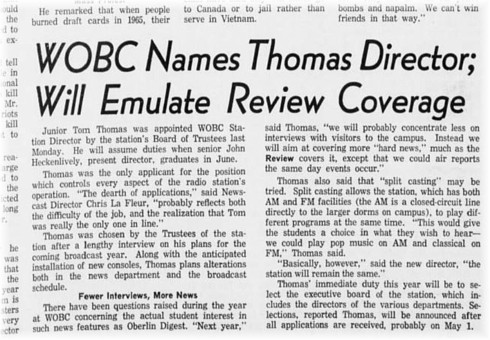
The headline seemed to imply that the radio station was planning to imitate the newspaper. My colleagues at the station took exception to that, and I immediately dashed off a letter to the editor to correct the misapprehension. When it didn't appear in either of the paper's editions the following week, my colleagues grew impatient.
About that time, Jan somehow injured her ankle on the steps of her dorm, South Hall. She broke a bone, limped for a while, and eventually required surgery.
|
One day that month, I was carrying around my audio cassette recorder. That has made it possible to add a few sound clips to a separate article on this website. First there's some talk about college grades versus real-world salaries. Next comes a vigil, a silent vigil, by anti-war protesters. Finally, you'll hear parts of a conversation between Jan and me as we leave the laboratory and discuss her bicycle, her parents' attitudes about skydiving, and some folks apparently dressed for bed. Click on April Twenty-Four. |
"Section Autonomy" Fallout
The front page of the April 30 issue of the Review reported the resignation of the college's Dean of Women, due to the campus's changing social mores.
|
However, she told the paper, “I can't work effectively unless I work enthusiastically.” After students started pressing for liberalized co-ed visitation rights, she'd been thinking of resigning “about all the time.” To grant dorm sections “autonomy” (allowing their residents to welcome members of the opposite sex at any time of day) would be “a gross invasion of the privacy of other section members,” she said. A woman on her way down the hall to the bathroom shouldn't have to bump into a man. Social interactions should not take place in bedrooms, but rather in proper locations like first-floor parlors “normal and approximate to the home entertainment setting.” |
|
Most of the younger generation disagreed, however. Just two and a half years later, a Life magazine cover story revealed the shocking news from Oberlin. Not only were some sections now open to the opposite sex, but entire dormitories had been converted to full-time co-ed living!
Back at the Station
My letter to the Review finally appeared in that same issue on April 30, 1968.
“To the Editor:
“I hope that the headline on your article of April 19 reporting my appointment as WOBC Station Director didn't mislead too many people. WOBC certainly will not try to ‘emulate’ the Review's news coverage next year. In talking with your reporter, I did compare the plans of our news department with the general procedure of Oberlin's campus newspaper, but only to explain what I meant by saying that WOBC's emphasis will shift from ‘soft’ news to ‘hard’ news: hard news consists of stories that will be out of date tomorrow, stories such as are carried on the front page of a newspaper, while soft news consists of feature stories and interviews that can be broadcast weeks after they are recorded. We will continue to carry both, but we will put more effort into covering all important stories immediately and in accurate detail; we feel that this is what our listeners want most.
“To ‘emulate’ the Review would not be a good idea. For one thing, it sometimes gets its facts twisted, as in this headline; for another, a newspaper is able to cover more stories of a less-than-urgent nature and to do it in greater depth than a radio station should even attempt. WOBC's function is to make the important facts available to its listeners accurately as soon as they are available, and therefore we are changing the emphasis of our news department to make it better able to fulfill this function.”
I was assembling my cabinet: a Program Director, two engineers, two business types, a Program Guide editor, and department heads for news, sports, classical music, popular music, fine arts, and public service. I solicited applications from current WOBC staffers, and if more than one person applied for a position, I had to decide (with advice from others) who should get the job. The final list was to be approved by the Board of Trustees on May 9.
|
COMING IN MAY: A box of fudge, a Republican National Convention (fake), a minor fire, extra-sensory perception, falling latex drops, some Deveraux creativity, and even more! Click here to continue. |

